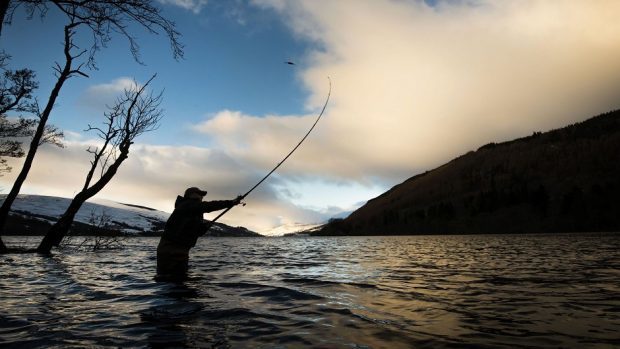The main trade body for salmon farming in Scotland hit back yesterday following a fresh wave of criticism about the industry’s impact on wild fish stocks.
Scottish Salmon Producers’ Organisation chief executive Scott Landsburgh said joint working and information sharing about both wild and farmed salmon was “surely the productive way forward”.
Blaming declining wild stocks on salmon farming ignored other factors, including global climate change, he added.
Mr Landsburgh was speaking after Scotland’s £1.4billion-plus aquaculture industry came under renewed attack from anglers and anti salmon farming campaigners.
Salmon and Trout Conservation Scotland (S&TCS), which aims to “protect fisheries, fish stocks and the wider aquatic environment for the public benefit”, launched a parliamentary petition calling for tighter regulation of salmon farms.
And award-winning angling author Bruce Sandison, an arch critic of salmon farming, warned “iconic” Atlantic salmon were facing imminent extinction on the west coast of Scotland due to the lethal impacts of escapes, diseases and parasites from salmon farms.
S&TCS said its new online petition followed the recent publication its report on the control of sea-lice on fish farms in Scotland over the past two years.
Director Andrew Graham-Stewart added: “Scottish Government’s lack of regulation has clearly been a major contributory factor in the industry’s failure to keep sea-lice numbers below acceptable levels.
“The current regulatory regime for fish farms gives very little protection to wild salmon and sea trout and is untenable.”
Mr Sandison, on behalf of the Global Alliance Against Industrial Aquaculture, said: “Nothing has been done and nothing is proposed to be done to halt the catastrophic collapse of wild salmon and sea-trout in the west Highlands.
“Informed observers believe that disease and pollution from primarily Norwegian-owned factory fish farms has brought distinct populations of wild salmon and sea-trout in many rivers, such as the River Balgy, to the verge of extinction.”
Mr Landsburgh said: “It is, of course, regrettable that the status of these rivers is so poor.
“Very few Scottish rivers are in good form for wide variety of reasons, for example global climate change has altered salmon feeding grounds at sea and means that fewer survive to make it back to their rivers in Scotland.
“The salmon farming industry’s joint working with wild fisheries organisations has shown a productive and co-operative relationship looking at restoration and restocking projects.
“Work has focused on the importance of maintaining and improving river habitats and encouraging catch and release rather than depleting the river populations.
“Industry technical expertise and facilities have also assisted a restocking programme of the River Lochy, as part of a wider five-year project to assist 14 different rivers in Lochaber.
“This sort of joint working and information sharing about both wild and farmed salmon is surely the productive way forward.”
